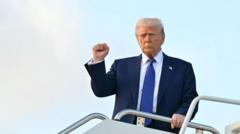John Simpson reflects on how Trump's prioritization of American interests could alter the foundation of U.S. foreign policy, reshaping historic alliances and geopolitical norms.
**2025: A Potential Turning Point in Global Politics Amid Trump's Influence**

**2025: A Potential Turning Point in Global Politics Amid Trump's Influence**
As Donald Trump's approach to international relations diverges significantly from his predecessors, 2025 may usher in transformative shifts for global dynamics.
In the annals of history, certain years stand out as catalysts for profound change, much like 1968 and 1989, which were pivotal moments that reshaped global landscapes. According to John Simpson, the current trajectory suggests that 2025 could join that roster of transformative years, primarily due to the actions and attitudes of Donald Trump.
Since World War II, U.S. presidents traditionally adhered to geopolitical doctrines that emphasized keeping Europe safe from Russian aggression and containing Chinese influence in Asia. However, Trump has fundamentally altered this paradigm, prioritizing America’s self-interest above all else, largely resolved around the cost implications for the U.S.
This shift presents a challenge for allies, particularly in Europe, as Trump's behavior and personality—often labeled as self-centered—complicate diplomatic relations. Observers note that Trump’s reliance on sycophantic advisors who echo his views may lead to increasingly unconventional policies. This has troubling implications, especially when false narratives, such as allegations against Ukrainian President Zelensky, are pushed without contrary voices in his circle.
Despite claiming to aim for a swift resolution to the ongoing Ukraine conflict, Trump’s approach reflects a lack of concern for the nuances involved in such negotiations. Historical perspectives suggest that Trump's failure to leverage notable diplomatic advantages—like Russia's international isolation or Ukraine's NATO aspirations—potentials for more favorable agreements were squandered early in the discussion process.
With the upcoming midterm elections in 2026 presenting possible challenges to Trump's currently unchecked power in Washington, momentum may shift. Political analysts warn that the current trajectory could embolden adversaries such as China, while economically straining allies like the EU.
As the dynamics around peace in Ukraine continue to develop, there are troubling signs that the U.S. could be less influential in negotiations. The potential for Russia to secure favorable outcomes from the war could mark a significant shift in post-WWII diplomatic norms, leading to global repercussions that may echo long into the future.
If these developments come to fruition, 2025 could indeed be a landmark year in which global history is rewritten—and past assumptions are irrevocably altered. The unfolding geopolitical situation demands close monitoring as we head deeper into this pivotal chapter.




















